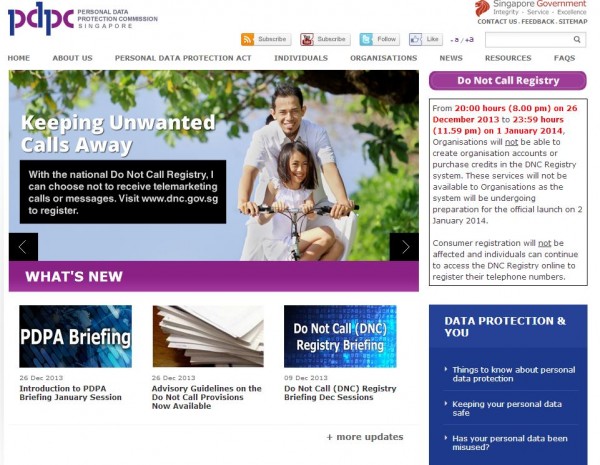
Just days before landmark privacy regulations are to come into effect in Singapore, the government regulator has suddenly changed its mind and decided it’s okay for companies to continue sending users telemarketing messages as long as they have an “ongoing relationship” with the companies.
Despite already saying no to such messages, phone users will still receive SMSes or faxes, say, to sign up for related services even after January 2, 2014, the day a do-not-call list comes into effect.
Simply put, the say-no-to-spam list that you have signed up this past month is not enough to keep annoying phone spammers away. You still have to unsubscribe individually to each company – just like before the long-deliberated privacy law had been drawn up.
If this sounds like a complete U-turn, the government regulator will remind you that the new exemptions it announced for companies today is meant for SMSes and faxes only. The do-not-call list maintained by the Personal Data Protection Commission will still bar companies from calling you if you have opted out.
But that is small consolation for phone users here, who have been clamouring for tighter controls over who may contact them for telemarketing purposes.
With the new exemptions, the do-not-call list has become a pale shadow of what it was supposed to be. What’s the point of signing up for a do-not-call list if you still have to say no to each and every spammer out there? Is saying no to the regulator not enough?
Strangely, the privacy commission now says there is a chance that people who are on the do-not-call list might miss out on “relevant information”, such as benefits from using a membership.
Well, users can always exempt organisations which they want to get messages from. If you like your telecom operator or favourite supermarket to keep reminding you of offers, you can just tell them so. That wasn’t enough, apparently, to the privacy commission.
It is supposed to be on the side of the public, to prevent spam from overloading users’ mailboxes and to let people say no to unsolicited marketing calls. Yet, it now finds it necessary to make a dramatic last-minute decision to make sure users receive information like membership privileges?
And this, after years of deliberation, feedback from the public and the industry, and having an important privacy law finally passed in Parliament last year.
Businesses have had 18 months to comply with the new rules. And going by the early rush to sign up to the do-not-call list, phone users here have been looking forward to the regulations to come into effect.
Now, these exemptions by the privacy commission have made a mockery of the progress made so far. In making a dramatic change in the very last minute, just as the new rules are to kick in, it has drastically reduced the protection that consumers have desired for years.
Worse, the move makes one question the type of decision making that is carried out for such important national matters. Why did the privacy commission, part of the Ministry of Communications and Information, deem it necessary to change its mind at the very end?
Indeed, Members of Parliament who debated at length before the Personal Data Protection Act was enacted last year should question if the latest changes are in line with how they had intended the law to work for the public.
Because, make no mistake, come January 2, 2014, spam will still be a problem for phone users.
NOTE: The article originally referred to the Personal Data Protection Act as anti-spam regulation. This has been changed to privacy regulation to avoid confusion with the earlier Spam Control Act relating to e-mail spam.






Telemarketing can provide accurate information on advertising effectiveness…
Oh, by the way, if anyone owes the banks/ credit card companies money, this list becomes their update-of-personal-particulars registry, FYI.
Yeah, without the protections it endows its another verify-your-info-with-us-so-we-can-spam-you operation.
How much were the PDPC paid? That is what I’d like to know. Drastic changes can only come into effect with an equally drastic amount of money.
https://www.facebook.com/NoDNCExemption
Support the cause! Say No to DNC exemption
WE have been waiting for so long!
Honestly I tink there is no issues with that.. for me, the only annoying thing are the calls made to me and refuses to hang up even saying more than 10 times of no and I am not interested, esp during bz times at work..
in fact, I was hoping that they exclude smses from dnc because I really do not want to have to go to all the shops, that I have membership with, to do the subscription for the sms promos..
In any case, what was stated was companies who has ongoing relationship can continue to send thepromo via sms.. if the smses were from tuition agencies which u had nv sign up before.. I believe u can report them to the pdpc for them to act on these agencies..
Are “DO NOT DISTURB” signs in hotel working better than Singapore law on privacy?
This is stupid. What is the point of having this policy? The reason why I had signed up is because of I do not want to receive any of telemarketing call, sms and fax. I had been receiving a lot of tuition sms which I do not subscribe at all. I do not have kids, why I am interesting in such telemarketing?
Agree with the sentiments of this article. Ultimately, nothing has changed despite all the preliminary steps taken.
Perhaps the regulation should be delayed until April 1st so that more pranks can be pulled?
obviously the Govt has been pressured by the Businesses again and they gave in as usual.
DNC has just become a do-not-check list for spammers and a joke registry for end users. Two step forward, one big step backwards.
Those MPs have a share in companies that are affected by new rules and they realise they will loose out quite a bit, so they pretend that they have the small business’s at heart when they did this U-turn …. typical $$$-faced
ZZ super disappointing. Bowing under the pressure of big corps I suppose.
one word Corporatocracy